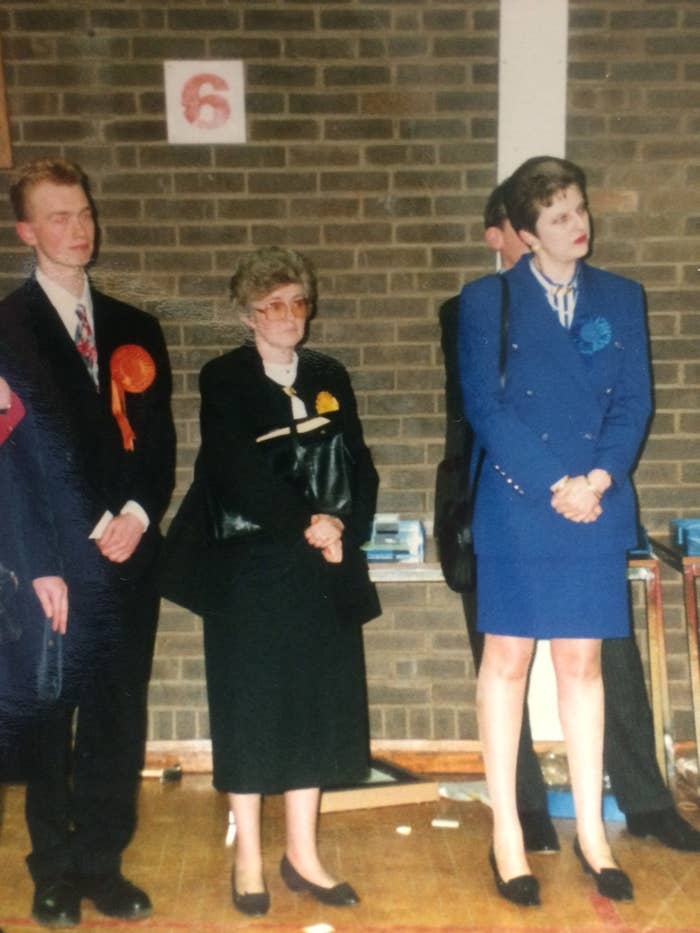
Theresa May was a "very smart" candidate who ran a clever "under the radar" campaign to maintain the Tory vote in an unwinnable northern Labour seat at the 1992 general election, according to her victorious opponent.
Labour's Hilary Armstrong defeated the future Tory prime minister when they both stood for parliament in North West Durham.
The Labour politician, who now sits in the House of Lords as Baroness Armstrong, told BuzzFeed News how she defeated the future prime minister – as well as sharing some vintage photos of the election count.
"I remember May as very smart, very together, and looking on the night as if it had all gone to plan," said Armstrong. "She was quite late arriving to the count, and I'd already heard she was dining in what was one of the best restaurants in the constituency. My sources were everywhere!"

May, who was a Tory councillor from London, knew she had no chance of winning the constituency at a time when John Major was clinging to power – especially since local towns such as Consett and Crook had been hit hard by the decline of the steel and coal industries.
Instead, May wanted to show she could keep the Tory vote stable and gain CV experience for when she applied for a more electable seat ahead of the 1997 general election.
As a result she eschewed street-to-street campaigning in favour of holding small meetings in people's homes.
"I knew she'd had an 'under the radar' campaign, where May held small get-togethers in supporters' houses, with their friends and neighbours," remembered Armstrong.
The Labour MP was easily re-elected with 26,734 votes, with May finishing second with 12,747 – a decline of just 38 votes on the previous election.
The third candidate in North West Durham, a 21-year-old Liberal Democrat who was president of the Newcastle University student union, finished last with 6,728 votes. His name was Tim Farron, and he would later become MP for Westmorland and Lonsdale and then leader of the Lib Dems.
Thanks to my dad's pile of old newspapers, here are the candidates for the first election I voted in!
Armstrong says she was impressed with May's campaign, which focused on the rural parts of the constituency and was "enough for her to nearly maintain the Tory vote".
The Labour MP went on to serve as a government minister for Tony Blair's entire period as prime minister, returning to the back benches in 2007 before leaving the House of Commons in 2010. She later joined the House of Lords, where she still plays an active role in defeats of the government.
Theresa May later stood against Labour's Margaret Hodge in the 1994 Barking by-election. After unsuccessfully applying to be the Tory candidate in three other constituencies – Tewkesbury, Chatham and Aylesford, and Ashford – she was eventually selected for the safe Conservative constituency of Maidenhead.
In a Guardian interview from 1995 – unavailable online – May said she was proud to be selected for Maidenhead without needing any affirmative action: "I'm totally opposed to Labour's idea of all-women shortlists and I think they are an insult to women. I've competed equally with men in my career, and I have been happy to do so in politics too."
She also said her husband was not involved in her career: "There's no question of my husband rustling up sponge cakes. He is completely supportive, but he has his own job to do."

However, Armstrong insists May had changed her approach when applying for other constituencies: "May very much looked like the smart city woman in 1992, and developed a different look when she was going for Maidenhead."
But the Labour politician hopes that May still thinks about her time in County Durham when deciding government policy. "I hope... she learned something about Tory supporters and sympathisers in areas of the North," Armstrong said. "And that May also learned something about the North East and the challenges it faced, which might in turn help her understand its needs now."
